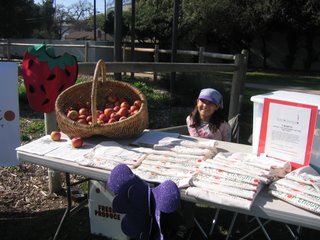Food For Thought-Part II

Fer: Is there any stories you would like to share about a child or a family that has been helped with what you do?
Marty Fujita: We get comments from kids and parents all the time about how much they appreciate what the Food For Thought program has done to raise awareness among the kids about making healthy choices and understanding where their food comes from, and who grows it, and to appreciate the farmer, the food and the environment that provides it for them. It is very gratifying to hear parents 'complain' that their kids are coming home and demanding that they find this kind of tangerine, or that kind of snap pea, or that the farm field trip was the best one they had ever experienced, or that they never knew that a fresh-picked strawberry smelled so good (and tasted as good as it smelled!), or that they didn't bring home any of the carrots the picked from the farm trip, because they ate them all before they got home!
Fer: What is the biggest need for your non-profit?(i.e. financial, volunteers, etc.) If people are interested in started a similar program in their area how would they do it?
Marty Fujita: We constantly have to raise funds to support our program and have been very fortunate in the past with great donors and foundations who believe in our program. We are able to get more volunteers as our program becomes better known, and awareness is raised.
Fer: Can you give me more specifics about your garden program? What does it offer the kids?
Marty Fujita: There are lots of garden-based learning curricula out there, especially in California. But we borrowed and adapted a terrific one called "Growing Great" that was developed for the Manhattan Beach Unified School District by Marika Bergsund. As I mentioned above, we are only providing this to K, 1st and 5th graders. K and 1st focuses on learning the basic parts of plants, and planting a salad garden. The kids all have a giant harvest day, and then make a huge salad they eat together. They love it! The 5th grade focuses on using the garden to learn the scientific method; they conduct a science experiment, changing one variable (water, nutrients, light) to measure affect on plant growth. They also plant a colonial/native American garden. The garden club is open to all kids who want to work in the garden during recesses. We had 90 kids at one school! After 5 hours of accumulated time, they get a Food For Thought cap. At the end of the year, the kids harvest, and hold a farmers market--last year they sold out! The funds go back into the garden club to purchase garden supplies.
Fer: Is there anything you would like to share that I didn't cover?
Marty Fujita: Check out our website, which we will soon update. There is lots of other information and links that might be useful to get a Farm To School program like ours started.
A special thank you to Marty Fujita for taking time to let us know more about this unique program. Wouldn't it be great if this program was the norm throughout our nation's schools? Please check out their website at www.foodforthoughtojai.org
Additional resources:
www.farmtoschool.org
www.ediblecommunities.com
Photo above by Marty Fujita

0 Comments:
Post a Comment
<< Home